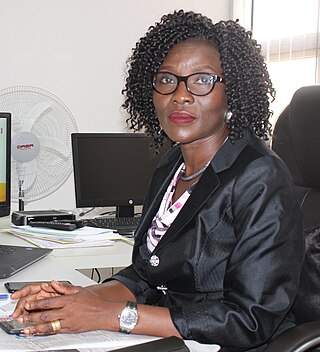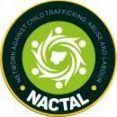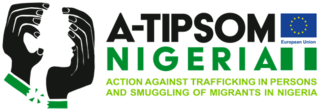Related Research Articles

The United Kingdom (UK) is a destination country for men, women, and children primarily from Africa, Asia, and Eastern Europe who are subjected to human trafficking for the purposes of sexual slavery and forced labour, including domestic servitude. It is ranked as a "Tier 1" country by the US Department of State which issues an annual report on human trafficking. "Tier 1" countries are those "Countries whose governments fully comply with The Trafficking Victims Protection Act's minimum standards for the elimination of trafficking. The TVPA is a federal statute of the United States. It is believed that some victims, including minors from the UK, are also trafficked within the country. It is also believed that migrant workers are trafficked to the UK for forced labour in agriculture, construction, food processing, domestic servitude, and food service. Source countries for trafficking victims in the UK include the United Arab Emirates, Lithuania, Russia, Albania, Ukraine, Malaysia, Thailand, the People's Republic of China (P.R.C.), Nigeria, and Ghana. Precise details about the extent of human trafficking within the UK are not available, and many have questioned the validity of some of the more widely quoted figures. In 2020, the US State Department estimated that there were 13,000 trafficking victims in the UK.
The Anti-Trafficking in Persons Act of 2003, officially designated as Republic Act No. 9208, is a consolidation of Senate Bill No. 2444 and House Bill No. 4432. It was enacted and passed by Congress of the Philippines' Senate of the Philippines and House of Representatives of the Philippines assembled on May 12, 2003, and signed into law by President Gloria Macapagal Arroyo on May 26, 2003. It institutes policies to eliminate and punish human trafficking, especially women and children, establishing the necessary institutional mechanisms for the protection and support of trafficked persons. It aims "to promote human dignity, protect the people from any threat of violence and exploitation, and mitigate pressures for involuntary migration and servitude of persons, not only to support trafficked persons but more importantly, to ensure their recovery, rehabilitation and reintegration into the mainstream of society."

Human trafficking in Australia is illegal under Divisions 270 and 271 of the Criminal Code (Cth). In September 2005, Australia ratified the Protocol to Prevent, Suppress and Punish Trafficking in Persons, especially Women and Children, which supplemented the United Nations Convention against Transnational Organized Crime. Amendments to the Criminal Code were made in 2005 to implement the Protocol.
Human trafficking in Canada is prohibited by law, and is considered a criminal offence whether it occurs entirely within Canada or involves the "transporting of persons across Canadian borders. Public Safety Canada (PSC) defines human trafficking as "the recruitment, transportation, harbouring and/or exercising control, direction or influence over the movements of a person in order to exploit that person, typically through sexual exploitation or forced labour. It is often described as a modern form of slavery."
Bangladesh is a source and transit country for men, women, and children subjected to trafficking in persons, specifically forced labor and forced prostitution. A significant share of Bangladesh's trafficking victims are men recruited for work overseas with fraudulent employment offers who are subsequently exploited under conditions of forced labor or debt bondage. It also includes the trafficking of children – both boys and girls – within Bangladesh for commercial sexual exploitation, bonded labor, and forced labor. Some children are sold into bondage by their parents, while others are induced into labor or commercial sexual exploitation through fraud and physical coercion. Women and children from Bangladesh are also trafficked to India for commercial sexual exploitation.
Barbados is a source and destination country for men, women, and children subjected to trafficking in persons, specifically forced prostitution and forced labor. Some children in Barbados are subjected to commercial sexual exploitation in “transactional sex” wherein a third party such as a parent receives a benefit from the child’s participation in sexual activity. Researchers identified patterns of transactional sex within families, most often by adult male caretakers such as step-fathers, as well as child prostitution outside the home. Women from the Dominican Republic, Guyana, and Jamaica voluntarily enter Barbados as illegal migrants, and some expect to engage in prostitution. Some of these women are exploited in forced prostitution subsequent to their arrival. Some other foreign women who entered the country illegally are exploited in involuntary domestic servitude in private homes. Foreign men have been transported to Barbados for the purpose of labor exploitation in construction and other sectors. Sex traffickers, primarily organized criminals from Guyana, form partnerships with pimps and brothel owners from Trinidad and Tobago and Barbados, and lure women to Barbados with offers of legitimate work. Trafficking victims tend to enter the country through legal means, usually by air; traffickers later use force and coercion to obtain and maintain the victims’ work in strip clubs, massage parlors, some private residences, and “entertainment clubs” which operate as brothels. Traffickers use methods such as threats of physical harm or deportation, debt bondage, false contracts, psychological abuse, and confinement to force victims to work in construction, the garment industry, agriculture, or private households.
Nigeria is a source, transit, and destination country for women and children subjected to trafficking in persons including forced labour and forced prostitution. The U.S. State Department's Office to Monitor and Combat Trafficking in Persons placed the country in "Tier 2 Watchlist" in 2017. Trafficked people, particularly women and children, are recruited from within and outside the country's borders – for involuntary domestic servitude, sexual exploitation, street hawking, domestic servitude, mining, begging etc. Some are taken from Nigeria to other West and Central African countries, primarily Gabon, Cameroon, Ghana, Chad, Benin, Togo, Niger, Burkina Faso, and the Gambia, for the same purposes. Children from other West African states like Benin, Togo, and Ghana – where Economic Community of West African States (ECOWAS) rules allow for easy entry – are also forced to work in Nigeria, and some are subjected to hazardous jobs in Nigeria's granite mines. Europe, especially Italy and Russia, the Middle East and North Africa, are prime destinations for forced prostitution.Nigerians accounted for 21% of the 181,000 migrants that arrived in Italy through the Mediterranean in 2016 and about 21,000 Nigerian women and girls have been trafficked to Italy since 2015.
Human trafficking in the Gambia covers ongoing activities in trafficking women and children in the Gambia as forced labor and prostitution.
Human trafficking in the Ivory Coast refers to the practice of forced labour and commercial sexual exploitation which uses Côte d'Ivoire a source, transit, and destination country for women and children who are trafficked for these purposes. Trafficking within the country's borders is more prevalent, with victims primarily trafficked from the north of the country to the more economically prosperous south. Boys from Ghana, Mali, and Burkina Faso are subjected to forced labour in the agricultural sector, including on cocoa, coffee, pineapple, and rubber plantations; boys from Ghana are forced to labour in the mining sector; boys from Togo are forced to work in construction; and boys from Benin are forced to work in carpentry and construction. Girls recruited from Ghana, Togo, and Benin to work as domestic servants and street vendors often are subjected to conditions of forced labour. Women and girls are also recruited from Ghana and Nigeria to work as waitresses in restaurants and bars and are subsequently subjected to forced prostitution. Trafficked children often face harsh treatment and extreme working conditions.
Ethiopia is a source country for men, women, and children subjected to trafficking in persons, specifically conditions of forced labor and forced prostitution. Girls from Ethiopia's rural areas are forced into domestic servitude and, less frequently, commercial sexual exploitation, while boys are subjected to forced labor in traditional weaving, gold mining, agriculture, herding, and street vending. Small numbers of Ethiopian girls are forced into domestic servitude outside Ethiopia, primarily in Djibouti and Sudan. While Ethiopian boys are subjected to forced labor in Djibouti as shop assistants and errand boys.

Finland is a transit, destination, and a limited source country for women, men and girls subjected to forced marriage, forced labor and sex trafficking. Finnish legislation condemns trafficking as a crime and has met the standards of the EU Protocol even before the convention came into effect. NGOs and the government cooperate in providing help for the victims of trafficking in Finland. Although the Finnish Police investigated and referred more people to care in 2013, prosecution and conviction numbers of suspected offenders remain low relative to the number of potential victims. The government is currently working on improving the anti-trafficking laws and practices to improve the situation. U.S. State Department's Office to Monitor and Combat Trafficking in Persons placed the country in "Tier 1" in 2017.

Beatrice Jedy-Agba is a Nigerian lawyer and anti-human trafficking advocate. She is the first Nigerian to be honored by the U.S. Department of State with the Trafficking in Persons Heroes Award 2014. She was Director-General of National Agency for Prohibition of Trafficking in Persons (NAPTIP) between 2011 and 2016.
Women Trafficking and Child Labour Eradication Foundation (WOTCLEF) is an anti-human trafficking organisation that attempts to stop human trafficking and child labor in Nigeria. WOTCLEF's areas of focus are: human trafficking, child labour, abuse of the rights of women and children and HIV/AIDS. The organisation helped create the National Agency for the Prohibition of Trafficking In Persons(NAPTIP) and the Network of Civil Society Organisation Against Child Trafficking, Abuse and Labour (NACTAL).
The National Agency for the Prohibition of Trafficking in Persons (NAPTIP) is a law enforcement agency of the Federal Government of Nigeria, founded on the 14th of July, 2003 by the Trafficking in Persons (Prohibition) Enforcement and Administration Act of 2003 in order to combat human trafficking and other similar human rights violations.

Network Against Trafficking, Abuse and Labour (NACTAL) is an umbrella organisation of Nigerian non-governmental organizations engaged in advocacy and campaign for children's rights, anti-human trafficking, human rights abuse and child labour with some 220 member organizations in the six geopolitical zones of Nigeria and the Federal Capital Territory.

Action Against Trafficking in Persons and Smuggling of Migrants in Nigeria is an 11th European Development Fund project which is implemented in Nigeria by the International and Ibero-American Foundation for Administration and Public Policies (FIIAPP).
Idia Renaissance is a non governmental civil society organization based in Edo State, Nigeria. The organization organize activities around human trafficking, including reception of victims of human trafficking. Idia Renaissance was founded by Mrs. Eki Igbinedion, wife of Chief Lucky Igbinedion, a former governor of Edo State. In 2021, Idia Renaissance partnered with the United Nations High Commissioner for Refugees (UNHCR) to create awareness on human trafficking and sexual exploitation of women girls.
The Nigeria Sexual Offender and Service Provider Database (NSOD) is a database that consists of the sexual offender register and the service provider register. It is a document of the National Agency for the Prohibition of Trafficking in Persons by the Federal Government of Nigeria, published in September 2019 to document cases of sexual violence and run background checks on sexual offenders in the 36 states of Nigeria.
The Violence Against Persons (Prohibition) Act 2015 is a law enacted by the National Assembly (Nigeria) and was assented to become law by President Goodluck Ebele Jonathan on 2015. The goal of the Act is to "eliminate violence in private and public life, prohibit all forms of violence against persons and to provide maximum protection and effective remedies for victims and punishment of offenders; and for related matters". The VAPP Act was enacted as a result of many gender-based violence and human right abuse happening in Nigeria, including rape, maiming of spouse, forceful ejection from home, forced isolation, acid bath, and killing.
Sex trafficking in Nigeria is a form of human trafficking which involves reproductive slavery or commercial sexual exploitation Nigeria. This involves the exploitation and movement of people from one location to the other through coercsion, deception or forcely to exploit them sexually for financial and sexual benefits.
References
- 1 2 "Trafficking in Persons (Prohibition) Enforcement and Administration Act". LII / Legal Information Institute. Retrieved 2022-03-30.
- 1 2 3 Federal Republic of Nigeria Official Gazette (2015). Trafficking in Persons (Prohibition) Enforcement and Administration Act, 2015 (PDF). Federal Government of Nigeria. p. 23.
- 1 2 Odunsi, Wale (2015-04-10). "Employ domestic help under 12 years, go to jail - FG warns". Daily Post Nigeria. Retrieved 2022-03-30.
- ↑ "Trafficking in Persons Report 2010 Country Narratives -- Countries N Through Z". 2010-06-17. Archived from the original on 17 June 2010. Retrieved 2022-03-30.
- ↑ "NAPTIP: We've rehabilitated over 17,000 trafficked victims since 2003". TheCable. 2022-03-10. Retrieved 2022-03-30.